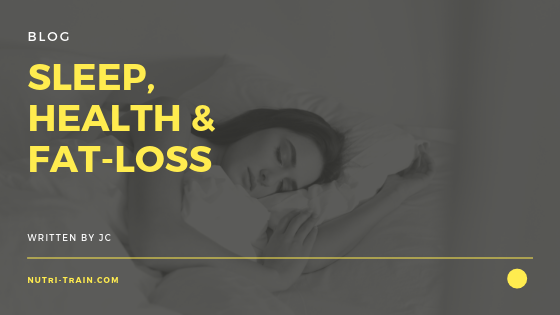|
According to recent reports[1], 3 out of 4 people aren’t getting the 7-9 hours required. In this blog, I explain sleep deprivation and deficiency, why they matter to your fat-loss results, what you can do to improve your sleep, and where you can start…. tonight! Sleep deprivation is the term used when we don’t get enough sleep, and sleep deficiency is broader, and occurs when your sleep cycle is out of whack, if your sleep doesn’t rejuvenate you, or if you have a sleep disorder that prevents you from getting enough sleep or causes poor quality sleep. Research indicates that failing to get enough sleep will undermine your fat-loss results, no matter how good your diet and training is. During a 2-week study[2], researchers found that sleeping for only 5.5 hours per night (compared to 8.5 hours) resulted in significantly less fat reduction, even though all subjects were on a moderately calorie restricted diet (the usual weight-loss method). However, of the overall weight-loss during this study, there was a bigger reduction in lean muscle (bad) in those sleeping for only 5.5 hour a night. Which means that not only can you lose more fat by sleeping more, but you can spare your lean muscle by doing so, too. We need lean muscle mass (ladies, you too), regardless of our health and wellness goal. A decrease in lean muscle mass is detrimental to metabolism, and in turn, our fat loss results. Yet, so many people forgo sleep, whether they’re staying up late to meet a deadline, fit in social commitments (late dinners and early breakfasts), and even when we’re striving towards improving our health and fitness (cutting sleep short for and early morning workout after only 4-5 hours sleep). I get it. Balancing work, life, family, friends, fitness, nutrition, etc., is TOUGH. But, if you’re trying to improve your health and fat-loss results, you may need to look at prioritising sleep. We tend to put too much importance on the stuff, whilst neglecting sleep. If you stop and think for a moment, you may be able to improve multiple aspects of your life (e.g., social and wellness and productivity!), if you gave up watching Netflix until midnight. That’s prioritising. Friends, health and your job matter. The Kardashians don’t (or whatever other junk TV you’re watching). I experienced this exact situation with a female client a few years ago, who’s aim was to improve her overall tone and fitness. After a few assessments, a food diary and two weeks of training her 3 x per week, it was evident where she was going wrong. Her diet and training were great, although her breakfast option did need a little tweaking (too many green smoothies, not enough wholefood and protein), but it was the way she approached her social life that cost her results. On average, she was out seeing friends 4 x a week until late, with a few early breakfast catch-ups before work. This took her weekly average sleep total to around 5 hours a night. We started to work on her sleep. First, I asked her to prioritise her calendar and only attend the events that were really important to her, or to let her friends/clients know that she had to leave by 9:30pm. Then, I asked her to minimise her alcohol intake to 1 glass of wine (contrary to population believe, alcohol, is actually bad for your sleep!). Around a month later (and an increase of around 40 minutes per night sleep), everything started to click. It was that simple. For many people, a typical breakfast is full of simple carbs and low on satiating protein and good fats. My clients ‘green smoothie’, for instance, had around 40g a sugar in it. Yes, even when its “natural fruit sugar”, it’s still sugar! What’s more, when you’re sleep deprived, you’re more likely to store energy as fat.[3] [4] In conclusion, if you truly want to improve your overall fat-loss results and maximise your healthy eating efforts, make sure you’re getting enough sleep each night. Sleep is free and requires zero effort. I’d love to know what you think, please leave a comment below. Speak soon, JC [1] Ministers may advise on how much sleep people need https://www.bbc.co.uk/news/health-48972243 [2] https://www.ncbi.nlm.nih.gov/pmc/articles/PMC2951287/ [3] https://www.ncbi.nlm.nih.gov/pmc/articles/PMC2084401/ [4] https://academic.oup.com/aje/article/164/10/947/162270
0 Comments
Leave a Reply. |
AuthorsJC and The Nutri-Team Archives
November 2020
Categories
All
|

 RSS Feed
RSS Feed
